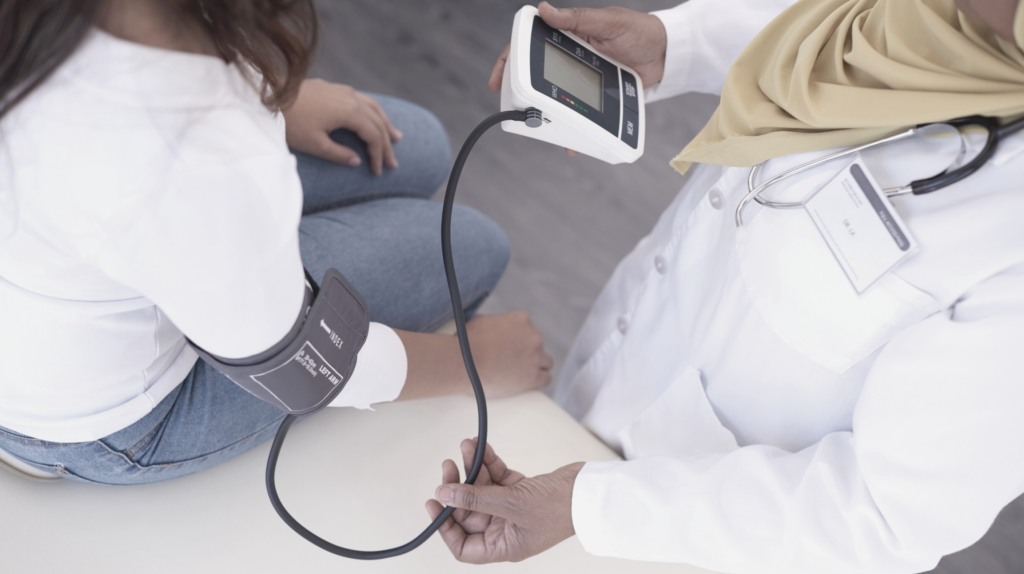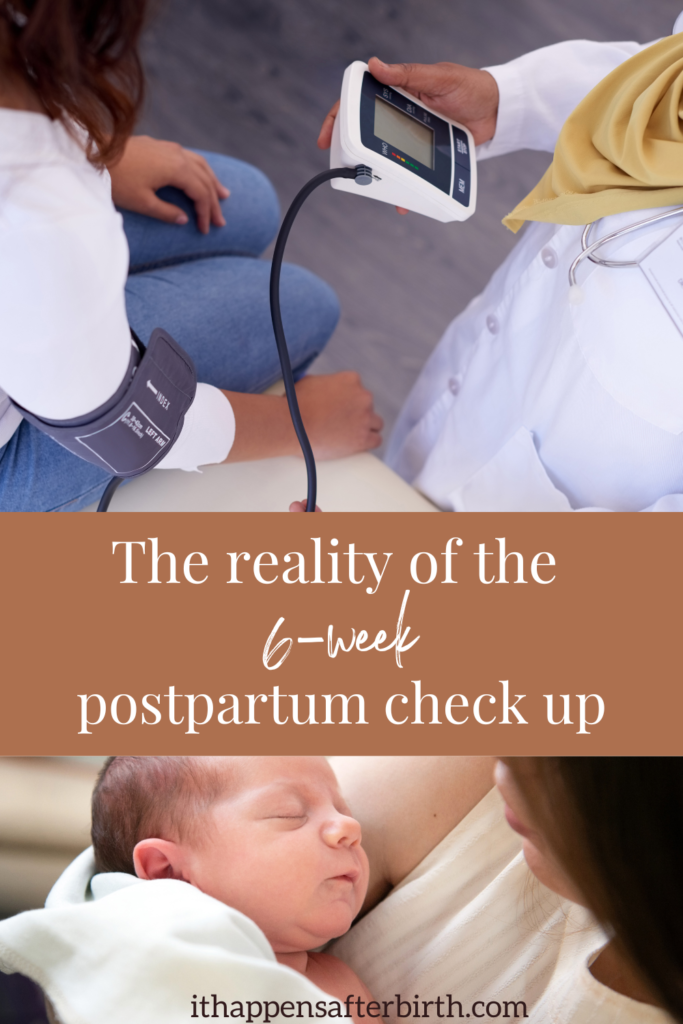Much like the due date doesn’t represent the exact date your baby is going to come out, the reality of the 6-week postpartum check up isn’t as simple as we might think.

You gave birth six short weeks ago, and you’re about to go in for your final (and in many cases, only) postpartum visit. But what happens at this check up? Does it mean that everything is about to go back to normal?
Most of the time, people look at the 6-week mark as the end of postpartum.
What happens at your 6-week checkup will be fairly straightforward, but it doesn’t always signal the end of recovery. Even if everything looks great “down there”, it doesn’t mean that you’re going to feel back to your old self.
Let’s take a look at what you can expect out of your 6-week postpartum check up- and what the reality of it might look like for you.
General health
Your provider will start with the basics- things such as weight check and blood pressure. They’ll make sure that your general health looks good before moving on to the more postpartum-specific examinations. Which are:
- Size of the uterus
- Stitches
- Pelvic and vaginal health
- Feeding and breast health
- Mental health
Size of the uterus
Your uterus grows to about 10 times its normal size during pregnancy. It’s not only growing a new human being, it’s growing an entirely new organ. After birth, it stays stretched out for a while- That’s why you can still look six months pregnant right after having a baby. It shrinks back down little by little, and by around two weeks it should be back to its normal, pear shaped size. Your provider will check to be sure that it has shrunk back to pre-pregnancy size. A uterus that isn’t shrinking back down usually indicates a problem.
Stitches
If you had a tear or episiotomy, you probably got some stitching done. Most providers use dissolvable stitches, which means they won’t have to be removed manually, and they should definitely be gone by the six week mark. (Sometimes they’re stubborn and hold on down there, and your provider will have to remove what’s left themselves.) They’re also going to check to make sure the tear or episiotomy has healed correctly.
If you had a c-section, they’ll check over the incision scar to make sure it has healed correctly and shows no sign of infection.
Pelvic Exam
Not all providers will give you a pelvic exam at this check up, but if you had a hospital birth, then chances are you’ll get one. Your provider will be examining your cervix, vagina, uterus, and pelvis to make sure that all is in good shape. They’ll check the strength of your pelvic floor muscles, and sometimes they’ll do a pap smear too.
Vaginal health
Even if not giving a full pelvic exam, your provider is still going to examine you down there. They want to make sure that physical healing is going as expected and that you aren’t experiencing any sort of infection.
This could be a good opportunity for you to ask your provider if you’ve had any scar tissue build up from the stitches. Catching any kind of issue like this early on can save you a lot of pain down the road.
Feeding and breast health
If choosing to breastfeed, your provider will ask how that process is going (and may make a referral if it isn’t going as well as you’d hoped.) They’ll check for tenderness, redness, or swelling in the breasts. They may also check your breasts for any lumps. The lumps (if they find any) are more likely to be a blocked milk duct or cyst than anything else, but they will do a more thorough examination if they find anything unusual.
Mental health
A lot of times, your care provider is going to use this check-up to ask after your mental health. They might do this by asking a few questions of their own, or by asking you to fill out the short questionnaire called the Edinburgh Postnatal Depression Scale.
It can be really hard to be vulnerable, but it’s important to try to answer each question honestly. This won’t diagnose you with anything, but it does show whether you’re at a higher risk of a postpartum mood disorder. This will help you, and those closest to you, to know that you might need to pay more attention to what’s going on under the surface.
At the end of the check up
Once the examination is over, your provider will ask if you have any questions. You may have been prepared with so many questions. Or you may feel lost and unsure of where to even begin asking. Whatever you ask, your provider will answer as best they can.
After that, they will sign off on a clean bill of health, tell you that you are free to resume normal activities, and send you home.
So you’re healthy, and your provider says you can go back to normal. But is “pre-pregnancy normal” possible?
The reality
We knew we’d get here eventually. We always do.
Reality is almost always the exact opposite of ideal. There are parents who really, truly recover fully by six weeks postpartum- and that’s wonderful for them! If that’s you, I’m happy for you. Ideally, that would be the same for all parents.
Realistically, birth and recovery are tough. And just getting a clean bill of health doesn’t mean you feel anywhere close to “normal” yet.
Yes, your uterus may have shrunk down to pre-pregnancy size. Does that mean that your pregnant-looking stomach will have gone away also? At six weeks postpartum? Not necessarily. Most of the time after birth, we’re left with stretch marks, loose skin, an extra pouch that wasn’t there before, and perhaps even diastasis recti. And your abdomen might still feel extra tender to the touch, more than it used to be.
And those stitches? They may have dissolved, but depending on how the stitching was done, you might have irregular healing or an abundance of scar tissue- something that can make sexual intercourse extremely uncomfortable or painful.
Speaking of which- your provider has cleared you for sex. And physically, everything may be in working condition. But that doesn’t mean that at six weeks postpartum, we are emotionally or even physically ready to have sex again. An eight-pound baby coming out of your vagina can make sex feel like the last thing you want to do. As a matter of fact, so can a major abdominal surgery. Your emotions and hormone levels might not put sex at the top of the list either. Do you know what is probably the most important thing to a mom with a six-week-old baby? Sleep.
And just because your provider says that your breasts are in good health, doesn’t mean breastfeeding isn’t still hard. It doesn’t make pumping and bottle feeding any easier. Your breasts grow and change during pregnancy- you may not even feel comfortable with them again yet.
The pelvic exam may have showed nothing unusual. But things like slight prolapse, and weak pelvic floor muscles are often overlooked. At six weeks postpartum, we’re still crossing our legs when we sneeze, and we definitely are not bouncing on any trampolines.
The reality of the 6-week postpartum check up is that it only provides one side of the story. It takes into account our basic physical health- Are our organs healing on schedule? Is there anything unusual that needs immediate attention? No? Then we are good to go.
It doesn’t look at our postpartum bodies as a whole. It doesn’t look at how we have changed and how we need to adjust. And it doesn’t look at our emotions- what we need to process, and how we need to heal.
Some perspective
To answer the question in the first paragraph: No, it doesn’t mean that everything is going to go back to normal.
The 6-week postpartum check up is important. As parents, we need more postpartum visits in the initial six weeks after birth, not less. But instead of having the perspective that it’s been six weeks, and they say I’m recovered, so I must be…
Or I should be….
Let’s look at it for what it is: One examination.
One that can tell us, hey, physically you seem to be getting along fine. Your body is working to recover the way it should.
But, that doesn’t mean there isn’t still more recovering to do. Sometimes our bodies need more time, and a little extra help. Sometimes, instead, our mental or emotional health need a lot more focus. Their recovery can take much longer than we anticipated.
Wherever we find ourselves after the 6-week postpartum check up, let’s just remember that one appointment doesn’t define our whole journey. And let’s keep giving ourselves grace for the journey that we’re on.


Great information! I wish I would have realized the reality a little sooner and not expected to go back to normal in that 6 weeks.